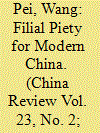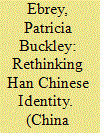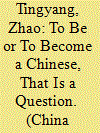|
|
|
Sort Order |
|
|
|
Items / Page
|
|
|
|
|
|
|
| Srl | Item |
| 1 |
ID:
189894


|
|
|
|
|
| Summary/Abstract |
After the Civil War of 1945–1949, Taiwan and mainland China were separated and developed two different systems: a British-American liberal-democratic capitalist system, and a socialist system with one-party dictatorship. Although differences between the two sides developed, there was still a consensus on "Chinese identity" during the rule of Chiang Kai-shek and Chiang Ching-kuo in Taiwan. This "Chinese identity" began to waver and the idea of "Taiwan identity" gradually emerged around the 1980s. As a result, the struggle between unification and independence in Taiwan sharpened. "The Taiwan nativists" (dupai) want to achieve the ideal of "independent nationhood." "The Chinese culturalists" (tongpai) hope to maintain exchanges and interactions with the Mainland to create a win-win situation, and finally lead to a unified China. The current ratio of independence to unification (eventual not immediate), in terms of votes in the 2020 presidential election, is 57 percent for the Taiwan nativists and 43 percent for the Chinese culturalists. The Chinese culturalists firmly believe that cross-straits competition is grounded in institutional (rather than existential) competition, and experiments in Taiwan will contribute to the future of "China." But they are facing three dilemmas. The first is pressure from mainland China with the possibility of military invasion. The second is pressure from the Democratic Progressive Party upholding Taiwan independence. And third, generational change: because of their lineage, educational, and cultural background, the Chinese culturalists are of an older age group, and as time goes on, the number of supporters will gradually decrease.
|
|
|
|
|
|
|
|
|
|
|
|
|
|
|
|
| 2 |
ID:
189893


|
|
|
|
|
| Summary/Abstract |
The legal concept of nationality was a Western import into China in the 19th century. The modern notion of nationality was a product of modern public international law and the domestic constitutional laws of Western states. In 1909, China under the Qing Dynasty enacted its first nationality law. After the Republic of China was founded, it enacted in 1912 a nationality law which was largely the same as the 1909 law. This law was slightly amended in 1914. After the Chinese Nationalist Party (Kuomintang) came into power, a new nationality law was enacted in 1929. This law is still largely in force in Taiwan today. The People's Republic of China only adopted its first nationality law in 1980. This law is still in force today. This article will trace the evolution of modern Chinese nationality law by examining the laws mentioned above. It will seek to understand the evolving Chinese nationality law in the light of its changing political and social contexts and the international environment in which China found itself.
|
|
|
|
|
|
|
|
|
|
|
|
|
|
|
|
| 3 |
ID:
189892


|
|
|
|
|
| Summary/Abstract |
Filial piety is a central virtue of Confucian ethics and widely viewed as an important part of what it means to be(come) Chinese. Confucian scholars emphasize the cultivation of filial piety (love and respect for parents) while assuming that parental love for children is innate. But this traditional view has led to the deformation of filial piety and twisted requests for parental love in both past and present-day China. In contrast, I will argue that long-lasting parental love also requires moral effort to become a virtue and that filial piety for the modern world cannot be morally justified without this form of parental love.
|
|
|
|
|
|
|
|
|
|
|
|
|
|
|
|
| 4 |
ID:
189891


|
|
|
|
|
| Summary/Abstract |
"Identity" for a group means both how we are the same and what makes us different from others. During the middle period, from the mid-Tang to the mid-Ming, the national identity involved a binary distinction between the "central country," the zhong guo, and the surrounding tribal peoples, the yidi. On one hand, this was a recognition of the strategic situation, one in which tribal peoples engaged in state-building and threatened central country dynasties. On the other hand, in the post-aristocratic world, a national elite needed a justification other than family pedigree; it found it in the idea that they as literati maintained the cultural traditions of the central country. This identity was tested when the tribal peoples conquered and distributed privileges based on ethnicity. Could national unity be maintained through the distribution of rights by ethnicity? Or would it require all within the borders to adopt a common culture? These questions are with us still today.
|
|
|
|
|
|
|
|
|
|
|
|
|
|
|
|
| 5 |
ID:
189890


|
|
|
|
|
| Summary/Abstract |
This article explores what we can learn about the history of the Han Chinese by bringing textual sources into conversation with current genetic research. It looks first at what Chinese wrote about their "we group" versus foreign others, especially in the long Middle Period from 400 to 1500, with attention to social and political context. It then turns to the genetic evidence, both from contemporary populations in the PRC and from ancient DNA from archaeological sites. When we look at both sets of evidence together, we are better able to evaluate the significance of each and come to a more grounded understanding of the growth of the Han Chinese ethnic group over time.
|
|
|
|
|
|
|
|
|
|
|
|
|
|
|
|
| 6 |
ID:
189895


|
|
|
|
|
| Summary/Abstract |
This article argues that there are important similarities between Zhao Tingyang's conception of tianxia and the decolonized, post-racial world envisioned by decolonial thinkers of the global south. Defined in terms of "internalization," "relationality" and "amelioration," the logic of tianxia that Zhao describes is comparable to the vision of a non-racialized world order of mutual, cultural synthesis of which decolonial thinkers have also spoken. Understanding tianxia in this way also allows us to better articulate the nature of "Chinese-ness." Traditionally China or "huaxia" was identified with civilization per se and Civilization as "huaxia" was not defined through ethnicity and so not the preserve of any one group of people. Under this understanding of "huaxia," to be(come) "Chinese" is merely to be civilized and civilization, in turn, is the ability to embrace the world in its totality. This paper expands on Zhao's definition of tianxia by arguing that culture (wen) should also be included as a non-reducible component of tianxia. This article ultimately argues that being "Chinese" should mean the ability to embrace and actively synthesize world cultures. This is the true meaning of "huaxia," a meaning that overlaps with important strands of decolonialism, and thus has more universal significance.
|
|
|
|
|
|
|
|
|
|
|
|
|
|
|
|
| 7 |
ID:
189888


|
|
|
|
|
| Summary/Abstract |
China is its history. In its long history of changes, we can see a more stable "methodological China" compared to the often-changing Chinese values and beliefs. It means China exists in its flexible ways of thinking and doing rather than in any unchangeable fundamentalist faiths. "Methodological China" refers to "exemplars," "political systems," "history-based civilization," "unchanged samples," as well as the "episteme of Chinese mind."
|
|
|
|
|
|
|
|
|
|
|
|
|
|
|
|
| 8 |
ID:
189887


|
|
|
|
|
| Summary/Abstract |
This article introduces the special issue exploring the question "What Does It Mean to Be or to Become Chinese?" Eight leading scholars from diverse backgrounds and disciplines wrote articles that discuss this question from three (somewhat overlapping) perspectives: A descriptive perspective, a historical perspective, and a normative perspective. I summarize each article and add some critical commentary.
|
|
|
|
|
|
|
|
|
|
|
|
|
|
|
|
| 9 |
ID:
189889


|
|
|
|
|
| Summary/Abstract |
Where did China come from? And who is Chinese? Or put more eloquently by the contemporary philosopher Zhao Tingyang in his asking: "When the Central Plain (Zhongyuan) of China was perceived by its inhabitants as the boundless center of the world—as tianxia—what were the causes, the forces, and the destiny that coalesced across four millennia to sustain the vital and generative unity of China as a state, as a civilization, and as a history?" For Zhao, to become China as a world, and to become Chinese persons of that world, is to participate in the intergenerational transmission of this shared, emergent, and unbounded whirlpool identity. I have argued elsewhere that persons as conceived within this Confucian tradition are not ontological human "beings" grounded in a notion of strict formal and causal identity (eidos and telos). Given what we might term "zoetological" (shengshenglun) rather than ontological assumptions, the identities of such relationally-constituted, holographic persons are not defined categorically, but instead emerge analogically. We might correlate Zhao's planetary understanding of tianxia as a Chinese "civilization-becoming" that having "no-outside" (wuwai) is holistic and inclusive, with my focus-field and holographic understanding of persons as "human becomings." Even though there are many persons who might resist this identity, it follows that at least from this Chinese point of view, everyone is in degree a participant in this shared and unbounded cultural ecology, and is thus, more or less Chinese.
|
|
|
|
|
|
|
|
|
|
|
|
|
|
|
|
|
|
|
|
|